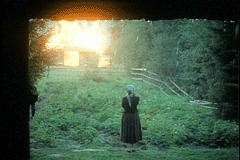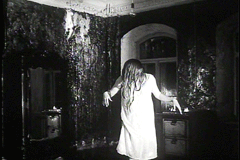The Mirror (1975) Andrei Tarkovsky
 Tarkovsky's films seem to expect a lot from the audience, and this one seems to
want more than most. Perhaps, we're fortunate that the director keeps the
running time under two hours here, then. The Mirror is exceptionally
self-referential, if I'm to believe what I've read about it, and it sure felt
that way as I watched it. The film's narrative is somewhat obscured, but it
basically consists of the regrets of a man that is dying in his 40's. The film
flashes back from this time period to what seems to be around WWII in his
childhood. Both time periods use the same actors in a variety of roles
(including the ballsy choice of casting the same woman as the lead's love
interest and mother) of and the adult narrator is rarely (if ever) seen on
screen, which adds to the confusion. We're never sure whether we're in the
present time or the past, so whenever the film switches time periods, it feels
as if we're in the here and now.
Tarkovsky's films seem to expect a lot from the audience, and this one seems to
want more than most. Perhaps, we're fortunate that the director keeps the
running time under two hours here, then. The Mirror is exceptionally
self-referential, if I'm to believe what I've read about it, and it sure felt
that way as I watched it. The film's narrative is somewhat obscured, but it
basically consists of the regrets of a man that is dying in his 40's. The film
flashes back from this time period to what seems to be around WWII in his
childhood. Both time periods use the same actors in a variety of roles
(including the ballsy choice of casting the same woman as the lead's love
interest and mother) of and the adult narrator is rarely (if ever) seen on
screen, which adds to the confusion. We're never sure whether we're in the
present time or the past, so whenever the film switches time periods, it feels
as if we're in the here and now.
The film is a phantasmagoric experience. Most of the
images that we see are absolutely stunning, and Tarkovsky has an uncanny knack
for focusing on one mind-blowing vista, then moving his camera to three more
within the same shot. Perhaps it's because of the protagonist's closeness to
death, and his imminent departure from the corporeal world, but the film has an
obsession with physical things. The camera stops to notice the wind blowing, a
spoon as it teeters then falls from a table, or the condensation from a glass as
it evaporates. The film takes everyday items and makes them feel surreal. It's a
remarkable achievement in cinematography.
 The performances are uniformly excellent. It's interesting that a film that is
so insular allows such a fully developed supporting cast. Surprisingly, the
film's introverted themes never feel self-indulgent, since Tarkovsky adds enough
universality to the themes of death and regret. His protagonist's eventual
coming to terms with his own death is quite beautifully staged, and the scenes
afterward suggest he was able to attain a reconciliation with himself before
dying. I do admit that there are some scenes in the film that I cannot quite
place, and imagine another viewing would do wonders. I imagine my hesitancy in
declaring the film a masterpiece has more with my own failings as a viewer than
the film's deficiencies. This is the sort of film that starts you off without a
net and leaves you to find your own footing. Some might view that as torture,
but I see it more as a too-uncommon challenge.
The performances are uniformly excellent. It's interesting that a film that is
so insular allows such a fully developed supporting cast. Surprisingly, the
film's introverted themes never feel self-indulgent, since Tarkovsky adds enough
universality to the themes of death and regret. His protagonist's eventual
coming to terms with his own death is quite beautifully staged, and the scenes
afterward suggest he was able to attain a reconciliation with himself before
dying. I do admit that there are some scenes in the film that I cannot quite
place, and imagine another viewing would do wonders. I imagine my hesitancy in
declaring the film a masterpiece has more with my own failings as a viewer than
the film's deficiencies. This is the sort of film that starts you off without a
net and leaves you to find your own footing. Some might view that as torture,
but I see it more as a too-uncommon challenge.
* * * *
October, 2001
Jeremy Heilman